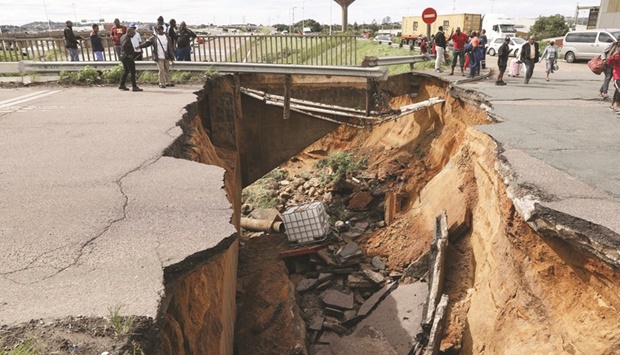At least 45 people have died in floods and mudslides after rainstorms struck the South African port city of Durban and surrounding KwaZulu-Natal province, the authorities said yesterday.
The country’s meteorologists forecast more “extreme” rains on the way this week, accompanied by “widespread flooding”.
“The latest reports indicate that more than 45 people have lost their lives as a result of the heavy rains, this number could possibly increase as more reports come in,” the province’s Department of Co-operative Governance announced in a statement.
Days of pounding rain flooded several areas, tore houses apart and ravaged infrastructure across the southeastern city, while landslips caused train services across KwaZulu-Natal province to be suspended.
The rains have flooded city highways, torn apart bridges, submerged cars and collapsed houses.
Several shipping containers that were stacked high atop of each other, fell like dominoes and lay strewn on a yard, while some spilled over into a main road in the city, one of southern Africa’s largest regional gateways to the sea.
The disaster management department in KwaZulu-Natal province, of which Durban is the largest city, urged people to stay at home and ordered those residing in low-lying areas to move to higher ground.
More than 2,000 houses and 4,000 “informal” homes, or shacks, have been damaged, provincial premier Sihle Zikalala, told journalists.
Rescue operations, aided by the military, are underway to evacuate people trapped in affected areas, the provincial Department of Co-operative Governance said.
The city had only just recovered from deadly riots last July in which shopping malls were looted and warehouses set on fire, in South Africa’s worst unrest since the end of apartheid.
A local humanitarian agency, Gift of the Givers, said: “The need of the hour is huge.”
The country’s rail service PRASA said landslips and rubble on the tracks had forced it to suspend all train services in the province.
Southern parts of the continent’s most industrialised country are bearing the brunt of climate change – suffering recurrent and worsening torrential rains and flooding.
Floods killed around 70 people in April 2019.
“We know it’s climate change getting worse, it’s moved from 2017 with extreme storms to supposedly having record floods in 2019, and now 2022 clearly exceeding that,” University of Johannesburg development studies professor Mary Galvin said.

A major crack is seen in the road following heavy rains and winds yesterday in the port city of Durban, South Africa.
